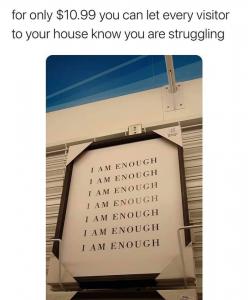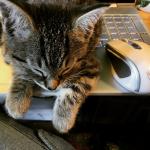A visual representation of me contemplating the day.
Goodness, 7 am comes dolorously early with the clamor of the interminable road works outside my open window after a night interrupted by a bored and angry kitten. I only ignored him by finishing my mystery novel on my kindle. It wasn’t bad, if totally implausible, which I believe is the point of every good mystery.
Today is the nineteenth birthday of my first child [that’s right, she’s nineteen, which makes me, what? forty something], and the time we bring back The–I say ‘the’ in a sort of cosmic sense–geriatric Cat that we foisted onto my parents so many months ago. They have to fly off to do the difficult work of sorting through their life in Kenya, part of which includes finding homes for eight or so cats other who won’t want to be uprooted any more than Bander will today. If you feel like praying, and even if you don’t, you should, because all of this seems insurmountable. Especially when one remembers that The Cat is the one who, so long ago, was lost and then found, but who never became mentally well after his ordeal and ours. It was like some terrible preview to covid, only ten years before we needed it.
But you know what’s really important right now? This, this article by Caitlin Flanagan:
I know I’m an addict because Twitter hacked itself so deep into my circuitry that it interrupted the very formation of my thoughts. Twenty years of journalism taught me to hit a word count almost without checking the numbers at the bottom of the screen. But now a corporation that operates against my best interests has me thinking in 280 characters. Every thought, every experience, seems to be reducible to this haiku, and my mind is instantly engaged by the challenge of concision. Once the line is formed, why not put it out there? Twitter is a red light, blinking, blinking, blinking, destroying my ability for private thought, sucking up all my talent and wit. Put it out there, post it, see how it does. What pours out is an ungodly sluice of high-minded opinions, sharp rebukes, jokes, transactional compliments, and mundane bulletins from my private life (to the extent that I have one anymore).
Oh and this:
We know on an intellectual level that social-media platforms are addictive. Sean Parker, the first president of Facebook, admitted as much in 2017 when he confessed that the site had been designed to exploit human “vulnerability” and to “consume as much of your time and conscious attention as possible.” We know this; we talk about it; we worry about children, or Cambridge Analytica, or Q, or any other damn thing except for ourselves. We don’t want to admit that each one of us has given a huge corporation untrammeled access to the delicate psychology that makes us who we are. On the other hand … after about a week I wanted back in. I knew the place was still hopping, because friends would email me updates that drove me wild with the need to comment. The writer Naomi Wolf was permanently banned from Twitter for her imperious anti-vaxxing during my absence. It was as though Twitter had thrown a cloth over her parrot cage—the chattering suddenly stopped, and she was silent. But I had thrown a cloth over my own parrot cage, so I couldn’t crow about it. Someone sent me news that the New York Times columnist Paul Krugman had written about “leprechaun economics” and the Irish ambassador to America had taken the bait and complained. It was a cultural moment that (in my opinion) screamed out for Caitlin Flanagan, but where was she? I texted the editor of this magazine: “Paul Krugman’s after me lucky charms!” The editor texted back, “I wish I knew what this meant.” I tried patching through to Old Media, sending the Times a letter to the editor in which I directed Krugman to W. B. Yeats’s Fairy and Folktales on the Irish Peasantry and its menacing description of leprechauns as “sluttish, slouching, jeering, mischievous phantoms,” suggesting that he should watch his back. Crickets from the Times. Did I even exist anymore?
Seriously, it’s worth the click. I feel like I may have avoided the kind of addiction she is talking about by not actually tweeting. The thing I keep battling is scrolling to see what other people have tweeted and then quietly judging them in my heart. Which is probably more wicked, but also easier to put down by just immediately clicking on a kindle book. Which is to say that this is my favorite part of Twitter:
As in, for less than 10.99, I can go and see who is really not coping. Well, maybe more than 10.99, maybe it’s the cost of my soul. I guess it will be good for me to severely limit my internet access for a few weeks. Have a nice day!














